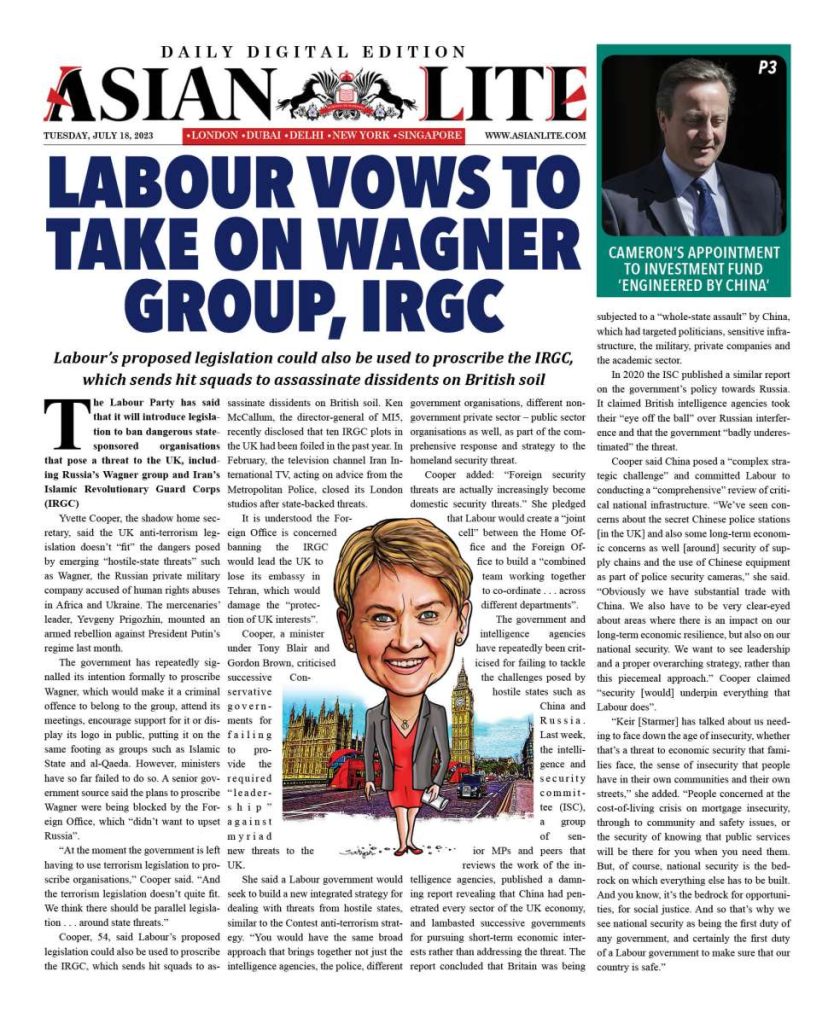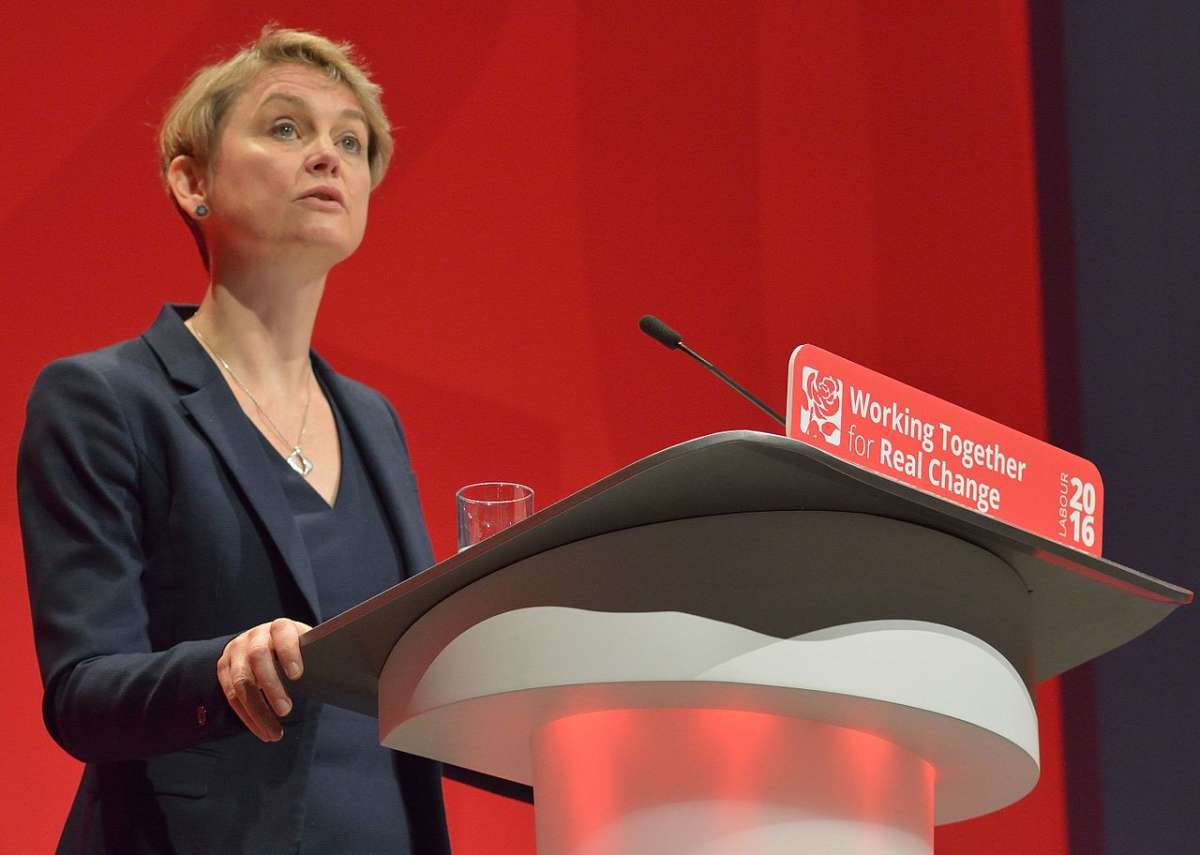Labour’s proposed legislation could also be used to proscribe the IRGC, which sends hit squads to assassinate dissidents on British soil…reports Asian Lite News
The Labour Party has said that it will introduce legislation to ban dangerous state-sponsored organisations that pose a threat to the UK, including Russia’s Wagner group and Iran’s Islamic Revolutionary Guard Corps (IRGC)
Yvette Cooper, the shadow home secretary, said the UK anti-terrorism legislation doesn’t “fit” the dangers posed by emerging “hostile-state threats” such as Wagner, the Russian private military company accused of human rights abuses in Africa and Ukraine. The mercenaries’ leader, Yevgeny Prigozhin, mounted an armed rebellion against President Putin’s regime last month.
The government has repeatedly signalled its intention formally to proscribe Wagner, which would make it a criminal offence to belong to the group, attend its meetings, encourage support for it or display its logo in public, putting it on the same footing as groups such as Islamic State and al-Qaeda. However, ministers have so far failed to do so. A senior government source said the plans to proscribe Wagner were being blocked by the Foreign Office, which “didn’t want to upset Russia”.
“At the moment the government is left having to use terrorism legislation to proscribe organisations,” Cooper said. “And the terrorism legislation doesn’t quite fit. We think there should be parallel legislation . . . around state threats.”
Cooper, 54, said Labour’s proposed legislation could also be used to proscribe the IRGC, which sends hit squads to assassinate dissidents on British soil. Ken McCallum, the director-general of MI5, recently disclosed that ten IRGC plots in the UK had been foiled in the past year. In February, the television channel Iran International TV, acting on advice from the Metropolitan Police, closed its London studios after state-backed threats.
It is understood the Foreign Office is concerned banning the IRGC would lead the UK to lose its embassy in Tehran, which would damage the “protection of UK interests”.
Cooper, a minister under Tony Blair and Gordon Brown, criticised successive Conservative governments for failing to provide the required “leadership” against myriad new threats to the UK.
She said a Labour government would seek to build a new integrated strategy for dealing with threats from hostile states, similar to the Contest anti-terrorism strategy. “You would have the same broad approach that brings together not just the intelligence agencies, the police, different government organisations, different non-government private sector – public sector organisations as well, as part of the comprehensive response and strategy to the homeland security threat.
Cooper added: “Foreign security threats are actually increasingly become domestic security threats.” She pledged that Labour would create a “joint cell” between the Home Office and the Foreign Office to build a “combined team working together to co-ordinate . . . across different departments”.
The government and intelligence agencies have repeatedly been criticised for failing to tackle the challenges posed by hostile states such as China and Russia. Last week, the intelligence and security committee (ISC), a group of senior MPs and peers that reviews the work of the intelligence agencies, published a damning report revealing that China had penetrated every sector of the UK economy, and lambasted successive governments for pursuing short-term economic interests rather than addressing the threat. The report concluded that Britain was being subjected to a “whole-state assault” by China, which had targeted politicians, sensitive infrastructure, the military, private companies and the academic sector.

In 2020 the ISC published a similar report on the government’s policy towards Russia. It claimed British intelligence agencies took their “eye off the ball” over Russian interference and that the government “badly underestimated” the threat.
Cooper said China posed a “complex strategic challenge” and committed Labour to conducting a “comprehensive” review of critical national infrastructure. “We’ve seen concerns about the secret Chinese police stations [in the UK] and also some long-term economic concerns as well [around] security of supply chains and the use of Chinese equipment as part of police security cameras,” she said. “Obviously we have substantial trade with China. We also have to be very clear-eyed about areas where there is an impact on our long-term economic resilience, but also on our national security. We want to see leadership and a proper overarching strategy, rather than this piecemeal approach.” Cooper claimed “security [would] underpin everything that Labour does”.
“Keir [Starmer] has talked about us needing to face down the age of insecurity, whether that’s a threat to economic security that families face, the sense of insecurity that people have in their own communities and their own streets,” she added. “People concerned at the cost-of-living crisis on mortgage insecurity, through to community and safety issues, or the security of knowing that public services will be there for you when you need them. But, of course, national security is the bedrock on which everything else has to be built. And you know, it’s the bedrock for opportunities, for social justice. And so that’s why we see national security as being the first duty of any government, and certainly the first duty of a Labour government to make sure that our country is safe.”
ALSO READ-‘Wagner not participating in Ukraine war in any significant way’







